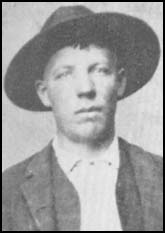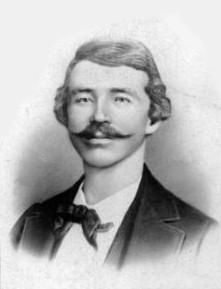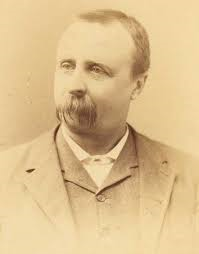Cole as goody
In 1903, at the age of 58, Cole Younger published an autobiography. He said in his preface:
Still, it makes an interesting and enjoyable read.
It is, by the way, cheaply available on Kindle, here, or can be accessed even more cheaply (i.e. free) on Google Books, here.
Youth
Cole says he had a happy childhood. His family were certainly well-to-do. “My father owned slaves and his children were reared in ease.” They owned two big farms in Jackson County, money-making stores and a livery stable in Harrisonville. Cole’s father Henry Washington Younger was also a mail contractor. Cole describes some distinguished ancestors with pride. His father was in fact a Union man, though Cole tries to mitigate, or gloss this:
He adds that among the women who lost their lives were Miss Josephine Anderson, and his sister’s death “simply blighted the life” of her brother William [now more commonly known as Bloody Bill Anderson], so that he became “the most desperate of desperate men”. Cole says, “’Quantrell sometimes spares but Anderson never’ became a tradition of the Kansas line. Before he died in a skirmish with Northern troops in 1864, he had tied fifty-three knots in a silken cord which he carried in his buckskin pouch.”
Cole says that he did well at school and says that as a youth he was always “kind and considerate” to “dumb animals or human beings.” I don’t know if he had a good editor or if his book was ghost-written but if not, he certainly seemed to have acquired a good education, for his autobiography is literate and well-phrased.
William Clarke Quantrill
Cole gives Quantrill’s background:
In Chapter 12, Quantrell on War, Cole describes how the guerrilla captain sought a colonel’s commission in the regular CSA army from Secretary of War Samuel Cooper. Actually, Cole was not present at the interview but gave his version: Cooper disparaged Quantrell, calling his form of warfare “barbarism”. Quantrell retorted, “Barbarism, Mr. Secretary, means war and war means barbarism”. Cooper asked him what he would do if he had the power and opportunity. “Do, Mr. Secretary? I would wage such a war s to make surrender impossible. I would break up foreign enlistments with indiscriminate massacre.” “What of our prisoners?” “There would be no prisoners.” Quantrell did not get his commission.
Cole joins Quantrell
At the start of hostilities Cole got into a fight (literally – he knocked the man down) with the same Captain Walley who would later be responsible, Cole believed, for the death of his father, and “It was ‘hide and run for it’ after that.” He says that “that winter” [November of 1861] he and his brother-in-law John Jarrette joined Quantrell’s company. Cole describes many incidents, and says that from time to time Quantrell would disband the band, as “it was harder to trail one man than a company”, and then later re-form. If you believe Cole’s account, the Confederates were always gallant and honorable in war while the Union troops were despicable and brutal.
In May 1862 Cole, Quantrell and a colleague named George Todd dressed as Union officers and went to Hamilton, MO, to buy ammunition. At another time Cole dressed as an old lady and went into Independence to spy on Union dispositions before an attack. “The attack was made and Col. Buell, his force shot to pieces, surrendered. The apple-woman’s expedition had been a success.” Yet again, Cole found some red sheepskin leggings and passed himself off as one of the Redlegs, carrying out a raid for horses. “One of the horses I got on that trip was the meanest horse I ever rode and I named him ‘Jim Lane’ in honor of one of the most efficient raiders who ever disgraced an army uniform.” These accounts may be true, though they do have an air of tall stories.
In, August 1862, aged 18, Cole was formally enrolled in the army of the Confederate States. He took part in the battle at Lone Jack in August, “one of the hardest fights of the war.”
Cole recounts how he saved the life of a certain Steve Elkins, a former schoolteacher of his, when he learned that Quantrell’s men had captured him and were about to execute him as a Union spy. Cole went to Quantrell’s camp and stoutly defended Elkins as a supporter of the South, though he knew that the man had recently joined the Union ranks, “but it mattered nothing to me – he was my friend.” Quantrell released the man into Cole’s hands. “It was my reputation that I never deserted a friend,” Cole wrote, proudly.
Lawrence
Chapter 14 is titled Lawrence and says it was “a day of butchery.” Bill Anderson claimed to have killed fourteen. Cole stoutly denies that any women were killed but undermines this when he goes on to say that “One negro woman leaned out of a window and shouted… She toppled out dead before it was seen she was a woman.” But I suppose she was black, so it didn’t count.
Cole quotes John N Edwards [Shelby’s adjutant, then pro-Confederate journalist and staunch ally of Jesse James] saying, “Cole Younger saved at least a dozen lives this day. Indeed, he killed none save in open and manly battle.”
Cole then says, “The horrors of guerrilla warfare before the raid at Lawrence were eclipsed after it. Scalping, for the first time, was resorted to.” This oblique construction does not say who started the scalping but it was “scalp for scalp thereafter.”
In the fall of 1863 Cole was promoted captain, at 19. He says that “our company, each man with a pair of dragoon pistols and a Sharpe’s [sic] rifle, was the envy of the Southern army.”
Out West
In May 1864 Cole was sent with Col. George S Jackson’s force of about 300 into Colorado “to intercept some wagon trains, and to cut the transcontinental telegraph line”. He says they had “a brief tilt” with some Comanches but “we had a real Indian fight with Apache
Mojaves which lasted through two days and the night between practically without cessation.”
On a secret mission, Cole says he and four others took a boat from San Francisco, disguised as Mexican miners, aiming for Victoria, British Columbia, where two vessels of the Alabama type were to be delivered for the CSA. “On our arrival at Victoria, however, we found that Lee had surrendered at Appomattox and the war was at an end.” However, in his Noted Guerrillas, JN Edwards wrote, “Lee’s surrender at Appomattox found Cole Younger at Los Angeles, trying the best he could to earn a livelihood and live at peace with the world.” Let us go with Cole’s version for the moment.
Cole exculpates himself from any part in the Centralia massacre (September 27, 1864) with one sentence:
.
.
Not guilty on all counts
It is at this time that he starts giving alibis:
Other alibis follow. The family was in Austin, Texas, where in 1870 and 1871 Jim was deputy sheriff and Jim and Bob sang in the church choir. And he adds:
So there we have it. Not guilty on all counts.
The phrase James-Younger gang is never mentioned. As far as Cole tells it, there were no robberies at all involving the two sets of brothers.
Cole does not hide the fact that his brother John, fourteen at the end of the war, was a wild one, and describes how John got into a fight in Independence and, defending himself, shot a young man named Gillcreas dead. In 1868, in Texas, when John would have been 17, “Clerking in a store in Dallas, [John] became associated with some young fellows of reckless habits and drank somewhat.” John was arrested for shooting the pipe out of the mouth of a man in a saloon, this too led to a shooting, and John fled on a stolen horse. He came back to Missouri in the winter of 1873/74. Cole describes the 1874 death of John, shot in the neck by “WJ Allen, otherwise known as Capt. Lull, a St. Louis plain clothes cop who passed by the name of Wright”, and once again John was an innocent victim.
Belle Starr
Some popular accounts and Hollywood movies have made much of a romance between Cole Younger and Belle Starr. Cole himself is at pains to pooh-pooh this. He calls such stories “fairy tales”.
He says he helped set Belle and her husband Jim Reed (who had fought with Cole) up on a farm in Texas but Cole writes “Aunt Suse, our family servant, warned me. ‘Belle’s sure in love with you, Cap’n Cole,’ she explained. ‘You better be careful.’ With that hint, I thereafter evaded the wife of my former comrade in arms.”
Reed was later killed “after the robbery of the stage near San Antonio” and Belle married again, “this time Tom or Sam Starr” and had a daughter they named Pearl. Later Belle came to Missouri “and boasted of an intimate acquaintance with me … and … declared that she was my wife, and that the girl Pearl was our child.” Cole adds, closing the subject, “Her story was a fabri
Northfield
Coming back to Missouri from Florida (Cole had spent time there under the pseudonym Captain Dykes) he and Bob found themselves suspected of the bank robbery at Huntington, West Virginia (they were totally innocent, naturally) and narrowly escaped arrest at the railroad depot at St Louis.
At last, though, Cole says that he decided to take part in the bank robbery at Northfield. He couldn’t very well give an alibi for that one.
It is clear from oblique remarks throughout the book that Cole and the Jameses did not get on. Cole rather damns Frank with faint praise when he says, “He was a good soldier and while he never was higher than a private the distinctions between the officers and men were not as finely drawn in Quantrell’s command as they are nowadays,” though of course in later life he worked with Frank on a Wild West show. He had even less regard for Jesse. “My feeling toward Jesse became more bitter … when after the gate robbery at the Kansas City fair, he wrote a letter to the Times declaring that he and I had been accused of the robbery, but that he could prove an alibi.” He added, “Jesse and I were not on friendly terms … and never were associated in any enterprises.”
The Northfield expedition, sans Jameses therefore, spent a week in Minneapolis playing poker and seeing the sights, and a similar time in St Paul. Cole says that was the last time he played cards. Now, he says, “it disgusts me even to see boys gamble with dice for cigars.”
In planning the robbery, “I urged on the boys that whatever happened we should not shoot anyone.” Bob Younger, Charlie Pitts and ‘Howard’ went in first but between them drank a quart of whiskey, “and there was the initial blunder at Northfield.” Cole quotes “a Northfield narrator” (unnamed) for what happened in the bank while he stood guard outside.
He describes the desperate flight. Miller and Chadwell were left dead on the Northfield street, Bob had a shattered elbow, Jim had a shoulder wound and Cole too was hit in the thigh. “There were a thousand men on our trail.” They abandoned their horses and proceeded on foot. “Howard and Woods, who had favored killing Dunning [a man they had come across but whom they released on the promise that he would not inform on them till they were well clear], and who felt we were losing valuable time because of Bob’s wound, left us that night and went west.”
In the last fight, near Madelia, MN, Pitts was shot through the heart, Bob was shot in the right lung, and Jim was shot five times, one bullet shattering his jaw and another embedding itself “underneath his spine”. Cole says, “Including those received in and on the way from Northfield I had eleven wounds.” Basically, they were shot to hell.
The Youngers were taken into Madelia and their wounds dressed. There was talk of a lynch mob, “But the only mob that came was the mob of sightseers, reporters and detectives.”
Prison for life
In Minnesota, then, a guilty plea on a murder charge meant there would be no capital punishment, and the Youngers therefore did not contest the charges and were sentenced “to imprisonment for the remainder of our lives” at the state prison at Stillwater. “With Bob, it was a life sentence, for he died there of consumption Sept. 16, 1889. He was never strong physically after the shot pierced his lung in the last fight near Madelia.”
Cole says that he submitted to prison discipline “with the same unquestioning obedience that I had exacted during my military service.” He says that when in 1884 there was a fire in the prison, he and his brothers guarded the women prisoners, and Cole was given a revolver by a warder to do so, which he returned afterwards. Later Cole was made librarian. Later still he was made head nurse in the prison hospital. He seems to have been a model prisoner.
Free
In 1901 Cole and Jim were granted parole. They were not to leave Minnesota and were to “conduct themselves honestly, avoid evil associations, obey the law and abstain from the use of intoxicating liquors.” On July 14, 1901 they were released. They had served 25 years. “Rip Van Winkle himself was not so long away.”
They got jobs at a granite company. Jim had to give it up because of the bullet in his back and went to work for a cigar company. Cole says his brother was subject to depression, and in his free time “he would go to his room and revel in socialistic literature.” On October 19 his dead body was found in a hotel room in St Paul. “There was every indication that he had carefully planned his death by his own hand.”
Cole, now the lone survivor of the Northfield band, moved to work for “the Interstate institute for the cure of the liquor and morphine habits” in St Paul. In 1903 he was granted a
conditional pardon; he must return to his home state and never come back to Minnesota.
The Wild West
A condition of Cole’s pardon was “that he will never exhibit himself or allow himself to be exhibited, as an actor or participant in any public performance, museum, circus, theater, opera house or any other place of public amusement or assembly where a charge is made for admission.” That seems pretty clear. Nevertheless, Younger appeared in the Cole Younger and Frank James Historical Wild West Show. He gave it ‘respectable’ pretensions, saying it as an attempt “to make an honest living and demonstrate to the people of America that [we] are not as black as we have been painted.”
There’s an entertaining cameo in the last chapter of Charles Portis’s fine 1968 novel True Grit in which Mattie seeks out Rooster at the show. She says that this was now all Cole and Frank were fit for, “to show themselves to the public like strange wild beasts of the jungle”. Mattie is taken with Cole. “I thanked the courteous old outlaw”, though she said to James, “Keep your seat, trash!” She says, “They think it was Frank James who shot that bank officer in Northfield. As far as I know that scoundrel never spent a night in jail, and there was Cole Younger locked This episode was not included in the 1969 John Wayne movie True Grit but the Coen brothers did put it in their 2010 film True Grit, with Don Pirl as Cole.
The end
Cole writes, as if regretting the Wild West show, “I had hoped … to earn a livelihood on the lecture platform” and he appends at the end of his book the lecture he wrote, What my life has taught me. Thank goodness he gave it rarely because it is insufferably pious, pompous, folksy, sanctimonious and sentimental in equal measure, almost impossible to read without throwing up.
Cole Younger, by Himself needs to be taken with a very substantial pinch of salt. I don’t believe it much more than I believe the lurid accounts of his nefarious deeds. But it certainly makes an interesting read.














2 Responses
I wonder if Cole had read the autobiography of John Wesley Hardin who also was always being picked on for no reason and only killed in self defense.
Richard
He could have done. It was published in 1896.
Jeff